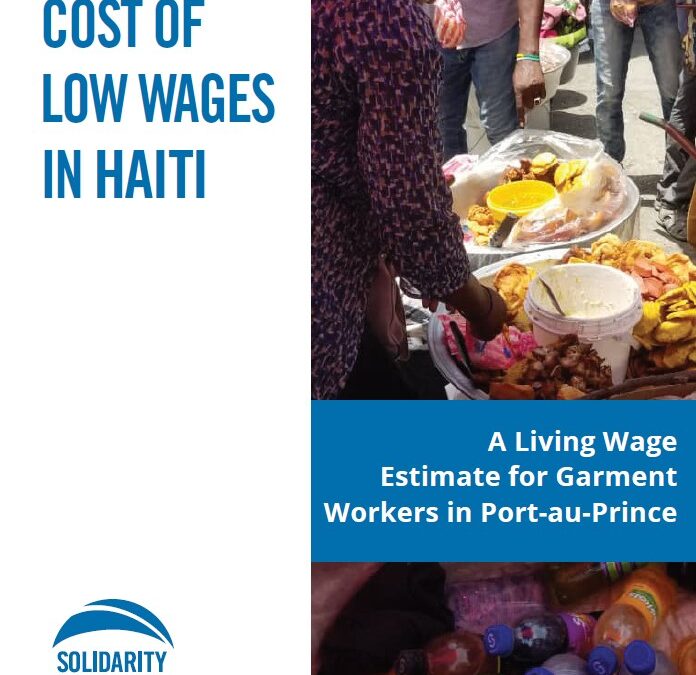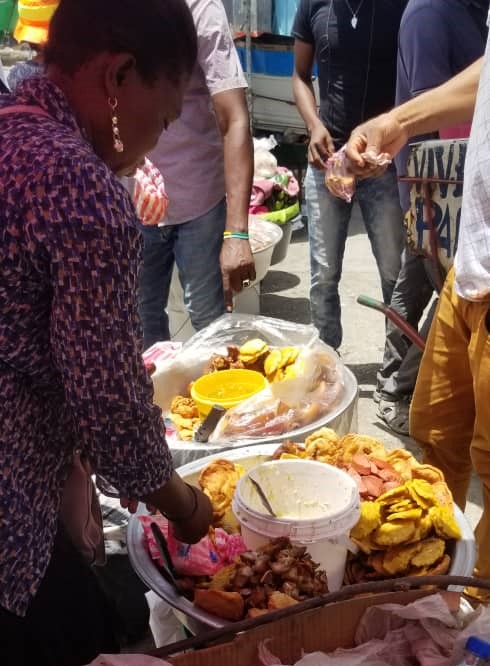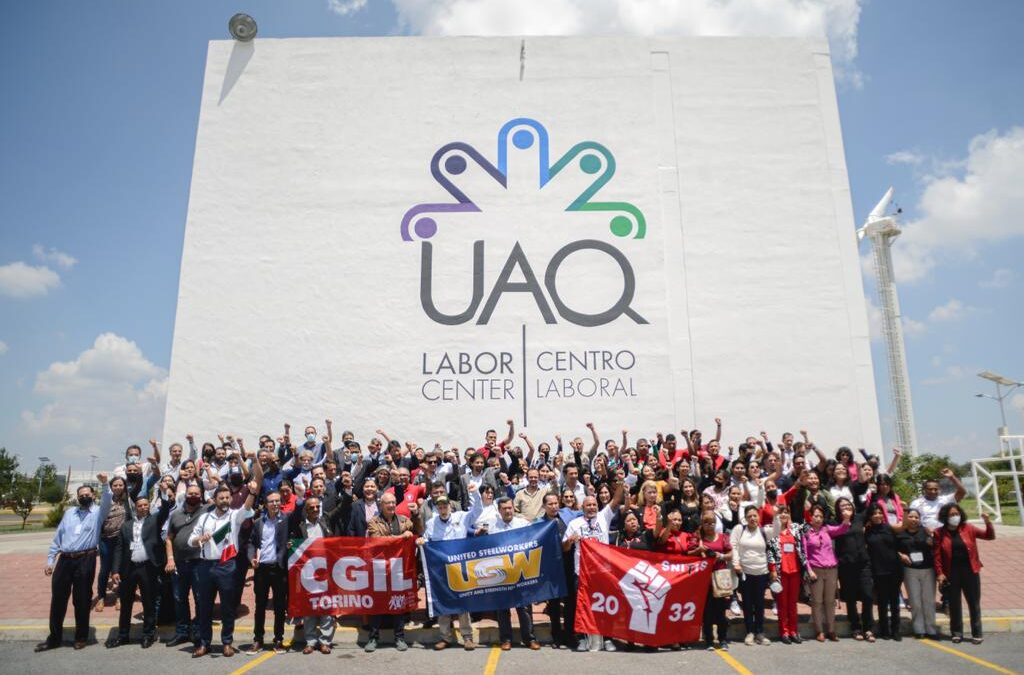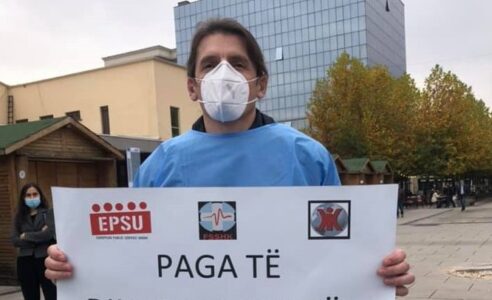Test photo story
Here is some text for this section.
Here is some text for this section.

Haitian garment workers face increasing difficulty in covering basic expenditures as prices soar while wages hover far below the cost of living.
Download in English and Haitian Creole.


.
Haiti garment workers should be paid four times their current salaries just to keep pace with the cost of living, a new Solidarity Center study finds. The High Cost of Low Wages in Haiti: A Living Wage Estimate for Garment Workers in Port-au-Prince, determined that based on the current minimum wage ($781 per month), workers spend almost a third (31.39 percent) of their take-home pay on transportation to and from work and a modest lunch to sustain their labor.
“The Haitian government must ensure that workers earn life-supporting wages,” according to the study, which recommends the Haiti government increase the minimum wage to a living wage and ensure that “workers’ rights to freedom of association and collective bargaining are fully respected, so that workers are empowered to negotiate wage increases and improve working conditions with employers.”
The report builds on two previous living wage studies the Solidarity Center published in 2014 and 2019 and an unpublished 2011 living wage report that demonstrate the daily minimum wage for garment workers is far less than the estimated cost of living—including in 2019, when inflation was 18.7 percent. The latest data from May 2022 show Haiti’s inflation rate at 27.8 percent.
Garment workers say that despite recent improvements in benefits, the current wage is far from what they need. In August, Haitian garment workers in Port-Au-Prince scored a victory after a coalition of unions negotiated an agreement with the government to provide garment workers with transportation and food stipends. The government made improvements in February, after garment workers and their unions held protests in January demanding a living wage in line with the Haitian Labor Code, which stipulates that if the inflation rate exceeds 10 percent, the wage is to be adjusted.
Haitians, especially the most marginalized, are suffering from a wave of violence this year that, along with fuel shortages, impact transport along Haiti’s roadways, preventing many apparel workers from getting to work and materials from arriving at factories. After paying a significant portion of their wages for transportation to work—and enduring an often-dangerous journey—some apparel workers are sent home without pay because the factory has not received supplies necessary for production, according to the report.
The country’s garment industry is the largest source of formal employment for workers in Haiti, where the majority of 58,571 garment workers are women and often the only wage earners for their families. Yet they routinely face worker rights abuses, including occupational safety and health violations and wage theft. Factory management frequently do not pay into the national health insurance system for occupational injury, sickness and maternity (OFATMA), failures that even have led to worker death.
To compile the study, three data collectors in May and June surveyed the prices of products and services for a locally appropriate basket of goods, including housing, transportation, food and education and used the standard 48-hour work week to determine cost of living needs.

A new Labor Center in Mexico will advise workers about their rights and how to mobilize and organize unions and collectively bargain. The Labor Center, at the Autonomous University of Querétaro in central Mexico, is supported by the Solidarity Center and the Labor Center of the University of California.
“The aim is to strengthen and promote the full recognition of labor rights, freedom of association and organization, and the democratic participation of workers through research, linkage and accompaniment,” said Labor Center Director Dr. Javier Salinas García. Salinas spoke at a recent Solidarity Center event in Mexico to announce the opening.
The Labor Center comes three years after Mexico’s government announced a series of comprehensive labor reforms to establish a democratic unionization process, address corruption in the labor adjudication system and eradicate employer protection (“charro”) unions prevalent in the country.
The Labor Center is “a way to respond to the needs of the situation,” said Beatriz García, Solidarity Center Mexico deputy program director.
“I think we all agree that Mexico is going through a historic moment. The labor reform responds to the demands that have been the objectives of the struggle of many workers for years, for decades, and reflects some positive practices of the independent unions,” she said.
The event featured a panel of independent union members and leaders who discussed the future of the labor movement in Mexico in the wake of historic labor law reforms.
Panelists explored the role that democratic and independent trade unions in promoting labor reform implementation in Mexico three years after the 2019 Labor Reform and negotiations of the United States–Mexico–Canada Agreement (UMSCA/T-MEC).
Speakers shared how they are using the tools of labor reform to organize on their worksites.
“We are the delegates, and we call our colleagues to share information about the Union League,” said Sonia Cristina García Bernal. “We have helped colleagues who were told they were going to be fired without severance pay. We have been able to get them severance pay. We have been able to get them rehired.”
“After these three years, the tool that we use the most is fast response mechanisms,” said Imelda Guadalupe Jiménez Méndez. “This has been a very important tool.”
In addition to Beatriz García, speakers included: Imelda Guadalupe Jiménez Méndez, Secretary for Political Affairs, the Miners Union (Los Mineros); Julieta Mónica Morales, General Secretary, Mexican Workers’ Union League (Liga Obrera Mexicana); Rita Guadalupe Lozano Tristán, Mexican Workers’ Union League (Liga Obrera Mexicana); Alejandra Morales, General Secretary, Independent Union of National Workers in the Automotive Industry; and Sonia Cristina García Bernal, Special Delegate, Mexican Workers’ Union League (Liga Obrera Mexicana).

Workers demanding relief from inflationary pressure on wages will launch a general strike on Thursday unless the Kosovo government grants public sector workers an emergency wage increase of almost $100 per month. This proposed amount will provide most public sector workers—including doctors and nurses—with an immediate 20 percent increase in lieu of a long-delayed wage law, says the Union of Independent Trade Unions of Kosovo (BSPK).
“It is the [failure of] the wage law that obliges us to go on strike,” says BSPK Chairperson Atdhe Hykolli, who announced that the work stoppage will last until the workers’ plea for relief is met.
According to BSPK, Kosovo’s workers and their families can no longer meet their basic needs due to historic inflation. The country’s inflation rate is inching higher each month, reaching a 14-year high of more than 14 percent in June and it increased again in July.
Escalating costs for food and non-alcoholic beverages, housing and utilities, and transportation are the main driver of inflationary pressure on wages in Kosovo. For the 12 months ending in June this year, the cost of transportation increased more than 30 percent while the cost of food and non-alcoholic beverages increased by more than 17 percent. From 2003 through 2021, the country’s inflation rate was less than two percent per year. The average public sector worker’s take-home pay of $542 has not increased since 2021.
“The situation for workers in Kosovo is like those in many countries around the world: Rising costs coupled with stagnant wages is simply not sustainable,” says Solidarity Center Southeastern Europe Country Program Director Steven McCloud.

In a significant assault on worker rights in Ukraine, President Volodymyr Zelensky last week signed into law legislation that deprives around 73 percent of workers of their right to union protection and collective bargaining.
“For more than 15 months, the Federation of Trade Unions of Ukraine, in solidarity with other trade unions, with support of the international community, actively opposed promotion of the anti-labor draft law,” the Federation (FPU) said in a statement.
The Confederation of Free Trade Unions of Ukraine (KVPU) stated, “KVPU will not tolerate a blatant violation of the rights of workers, their constitutional guarantees and international norms and standards. We will continue the fight for workers’ rights.”
The law references “freedom of contract,” which the non-governmental organization Labor Initiatives says “provides ample room for employers to prescribe literally any provisions in a contract, while workers, desperate for jobs during a pandemic, will likely accept such provisions.” Labor Initiatives is a Solidarity Center partner that works closely with unions and other NGOs, analyzes labor laws and advocates for worker rights at the individual and national levels.
The law applies to Ukrainian companies with fewer than 250 workers, and is valid during martial law in Ukraine, but labor experts express concern that it may be extended.
The law, which amended the Labor Code of Ukraine, is the latest in a string of legislation targeting worker rights and the ability of unions to function freely. For the past two years, lobbyists have pushed laws in Parliament that reduce wages, limit the use of formal contracts that ensure workers have job stability and weaken their collective voice by targeting unions. Under the restrictions of martial law and the chaos of war, members of Parliament have passed many of these measures.
“Instead of having some greater protection of labor rights, greater protection of the people who are baking bread, washing dishes or cleaning the streets, since March we faced very regressive labor reform in Ukraine,” George Sandul, a Kyiv-based labor lawyer, said on the latest episode of The Solidarity Center Podcast, where he detailed the laws.
The global labor and human rights communities have widely rallied in support of workers and their unions in Ukraine, many taking part in an online campaign to oppose the legislation.
The FPU points out that in 2021, the European Parliament indicated as part of the European Union–Ukraine Association Agreement that Ukraine’s “measures to improve the business climate, attract direct investment and promote economic development cannot be implemented at the expense of limiting workers’ rights and worsening working conditions.”
With martial law prohibiting workers from public protest and strikes, the FPU, KVPU and other Ukrainian trade unions say they will challenge the law in Ukraine’s Constitutional Court, the International Labor Organization and other international and European bodies.
“We will also vigorously oppose dozens of other anti-labor and anti-union pieces of legislation that government lobbyists are trying to push through the Parliament,” the FPU says.